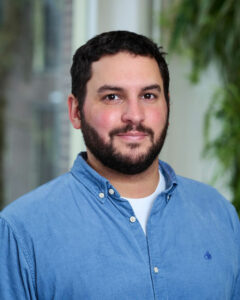 This fall, Tomás Dodds joins the School of Journalism and Mass Communication as an assistant professor. With experience as a journalist, foreign correspondent and researcher, Dodds brings a global perspective to the study of journalism, political communication and technology. At UW–Madison, he is launching the Public Tech Media Lab, which will partner with newsrooms to develop open-source tools and AI systems that serve the public good. Dodds’ work examines how new technologies shape newsroom practices, journalistic authority and the ways reporters understand their profession. Dodds’ position is a part of RISE-AI, an artificial intelligence-themed focus area of UW–Madison’s Wisconsin RISE Initiative, a strategic hiring effort to “help address significant, complex challenges of particular importance to Wisconsin and the world.”
This fall, Tomás Dodds joins the School of Journalism and Mass Communication as an assistant professor. With experience as a journalist, foreign correspondent and researcher, Dodds brings a global perspective to the study of journalism, political communication and technology. At UW–Madison, he is launching the Public Tech Media Lab, which will partner with newsrooms to develop open-source tools and AI systems that serve the public good. Dodds’ work examines how new technologies shape newsroom practices, journalistic authority and the ways reporters understand their profession. Dodds’ position is a part of RISE-AI, an artificial intelligence-themed focus area of UW–Madison’s Wisconsin RISE Initiative, a strategic hiring effort to “help address significant, complex challenges of particular importance to Wisconsin and the world.”
Hometown
Buenos Aires, Argentina.
Educational background
I have a B.A. in Journalism from the University of Chile, an M.A. in Sociology from the Pontifical Catholic University of Chile, and a Ph.D. in Cultural Anthropology and Development Sociology from Leiden University in the Netherlands.
How did you get into your field of research?
Very much by accident. It was always a toss-up whether I would continue working in journalism or pursue an academic career. For a while, I worked as a foreign correspondent for one of the biggest news agencies in the world. I also interned at the United Nations Human Rights Office and the Inter-American Commission on Human Rights (IACHR), because I was particularly interested in issues of international law, human rights protection and the way global institutions respond to political crises.
But curiosity kept drawing me back to academia. I didn’t want to leave the industry entirely, so for my doctorate, I conducted ethnographic research, spending seven months working every day as a journalist in two newsrooms. It was the perfect way to study journalism while continuing to engage in journalistic work.
That was when I realized the role different technologies were playing inside newsrooms and the impact they had, not only on journalistic practices but also on journalists’ professional authority and their own understanding of what it means to be a reporter.
What attracted you to UW–Madison and the SJMC?
I have been reading the work of scholars in SJMC since I was an undergraduate. The team in this department has played a significant role in shaping journalism studies, political communication and communication science more broadly. However, what truly drew me to SJMC was not these accolades or metrics. It was the collegial, friendly and collaborative working culture: an environment that closely aligns with the kind of place where I want to build the rest of my career.
What was your first visit to campus like?
My first visit to Madison was in January of 2025, and it coincided with the coldest day of that winter. I believe there was even an Extreme Cold Warning in place. Even then, I really enjoyed the city and am looking forward to continuing to explore Wisconsin (although hopefully with a bit warmer weather).
What’s one thing you hope students who take a class with you will come away with?
I want my students to leave with the understanding that they can resist or refuse many technologies that some are trying to impose on their lives. Although there is an uncanny sense of inevitability, of magical determinism, I want my students to stop repeating industry claims and appropriate these technologies in ways that align with their values and expectations.
Over the next couple of years, I’ll be teaching courses on open-source investigations, artificial intelligence and society, and platform studies. A key underlying idea across all these courses is that we have the power to develop and use technologies that serve the public interest, rather than simply becoming dependent on platforms and companies that profit from our data and attention.
How do you feel your work relates to the Wisconsin Idea?
As part of my onboarding at the University of Wisconsin-Madison, I am setting up a new research lab with a focus on journalism and public interest technologies. I have decided to call it the Public Tech Media Lab.
The Lab will operate at the intersection of journalism and public interest technologies. Our objective is to support local and national newsrooms in the development and implementation of open-source tools for digital investigations, and to design and evaluate artificial intelligence systems that serve the public good.
What’s something interesting about your area of expertise you can share that will make us sound smarter at parties?
During my course on open-source investigations, I teach students how to estimate the time a photo or video was taken by analyzing the shadows on the ground.
What do you enjoy doing when you are not working?
I am a big fan of scuba diving. I just spent four weeks in Tenerife working towards a rescue, guide and divemaster certification. Now I am planning my next dives in Silfra and Cape Town. I also enjoy camping and riding motorcycles, so I am excited to start exploring Wisconsin’s parks and nature. Any recommendations are welcome!